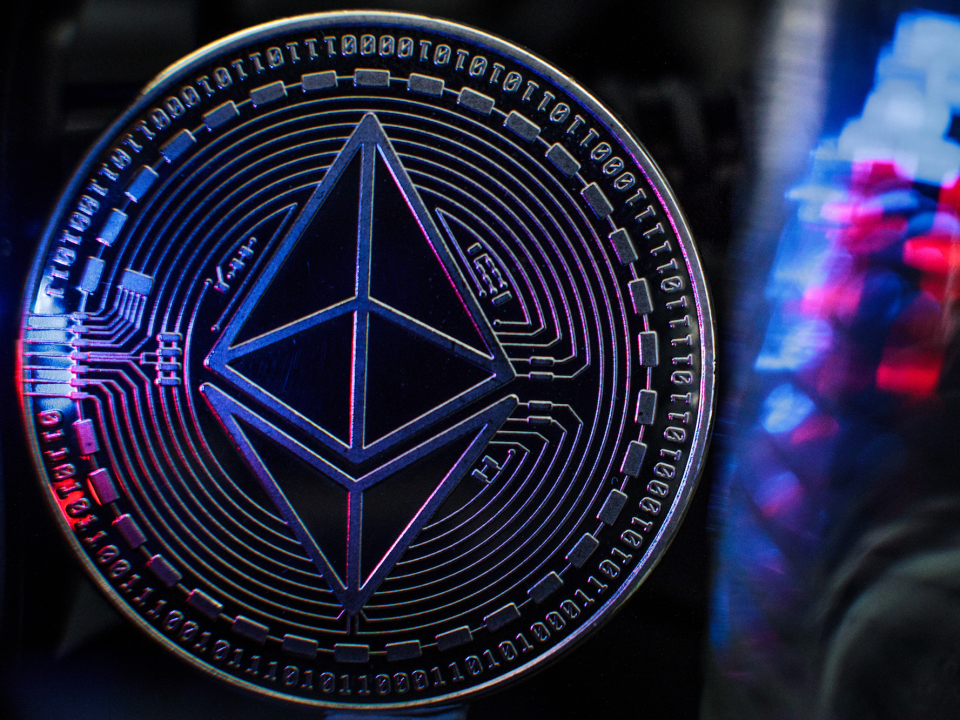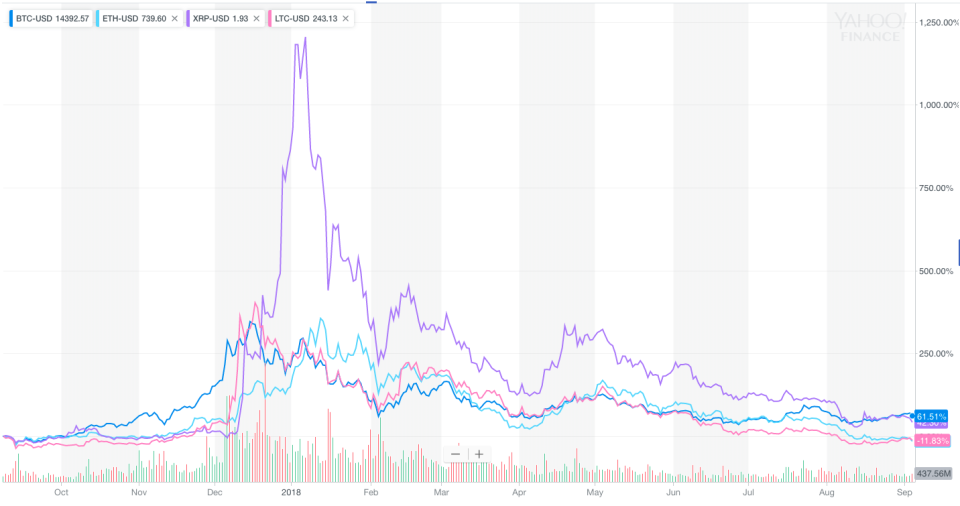Ethereum's future depends on comprehension and community support

The relevance of Ethereum today varies, depending on who you ask.
Even the cryptocurrency’s eight co-founders can’t agree on how exactly it needs to evolve. What’s better between centralization versus decentralization networks? How should authentication be developed and secured? What innovation needs to take place?
Co-founder Anthony Di Iorio says he believes it’s far from dead in the water.
“Ethereum is not a company, it’s one of many technologies out there and it has a lot of competition. It’s the second leading technology right now and it has the most community around it,” Di Iorio told Yahoo Canada Finance during the Blockchain Futurist Conference.
Di Iorio is the founder and CEO of Decentral, an innovation hub for disruptive and decentralized technologies. A Toronto-native, Di Iorio helped start the Toronto Bitcoin Meetup back in 2012. It was here where he met Ethereum creator, Russian-Canadian coder Vitalik Buterin. Di Iorio used funds he had accumulated from prior business dealings and funded the Ethereum project. Di Iorio is an investor in numerous crypto assets including ZCash and Qtum, too.
When asked if he worries about the value fluctuation seen in the cryptocurrency space, Di Iorio calmly says he doesn’t let it stress him. Like any market there will inevitably be highs and lows, and he takes “the good with the bad.”

“Last December you got people that were riding that wave [referring to the record breaking trade value of Bitcoin], and it really just comes down to value creation,” says Di Iorio. “There’s very little value that’s come out of these things yet, a lot due to limitations of the technology. They’re testing stuff right now and it’s going to take a lot of time for the value and the disruption of all these different sectors that will eventually come out, but it’s just not there yet. A lot of it is speculation.
“I don’t stress about it though. Some people probably do. Some people will get out of the space quick because it’s not what they were expecting, but I don’t stress about it,” he says.
Playing the long game
At its peak in late 2017, one bitcoin (BTC) was worth just under US$20,000. A year prior it was trading below US$1,000. Bitcoin reached US$6,000 in June, over $8,000 in July and dropped back down to $6,000 in August. It is currently holding around $7,000. At the time of publishing, one bitcoin is worth US$7,280.70.
As for Ethereum, one Ether (ETH), the network’s native token, currently sits at $224.59.
Both Bitcoin and Etherum are highly volatile.
“I’m invested in a lot, not just in the crypto space, and one of the reasons it that Ethereum could fail,” says Di Iorio. “I take more of a holistic approach to the entire ecosystem and I support many different projects. My goal has always been to power people with tools, and I think there is going to be a paradigm shift down the road from third party controlled lives to user controlled lives. We [at Decentral] create the tools that are already starting that.”
Di Iorio says he doesn’t see the mass adoption of these blockchain technologies happening right away. His focus is on finding a way to make things easier to adopt encourage the understanding of blockchain while accepting the ups and downs of cryptocurrencies.
“The experience is not there for the masses, for the general public to understand, and my goal is to simplify it and put it into an interface that people can easily use to move and mange different coins and different parts of their digital lives,” explains Di Iorio. He points to other areas as well that could soon be running on blockchain technologies. Ethereum and Bitcoin were just first to make noise.
“This technology could be used for other areas like digital wills where you could automatically disperse the money through smart contracts and pay your siblings, or whatever is stipulated, without needing to meet with a lawyer. That’s all going to be done from a wallet,” he says.
Part of Ethereum’s success is marked by the appearance of direct competitors. Cardano (ADA), led by fellow Ethereum co-founder Charles Hoskinson, uses a system that is arguably faster and more secure and centralized than Ethereum. It uses a Proof of Stake (PoS).
Four years ago, Hoskinson, as part of the Ethereum team, was interested in accepting venture capital and creating a “for-profit entity with a more formal governing structure,” according to Forbes. Vitalik Buterin was firm on his stance to keep Ethereum a “nonprofit organization with an open source, decentralized governance.” Hoskinson left the Ethereum organization in 2014.
For the most part, Buterin has been absent from the Ethereum discussion. He did make an appearance on Reddit to address the “inevitable collapse of ETH,” but has remained out of the public discourse, including the recent Blockchain Futurist Conference attended by his co-creators. Buterin did say online that he believes Ethereum needs to evolve and noted the Ethereum community is considering two proposals to hep put ETH in a better position.
Like Ethereum co-founders and supporters suggest, the key to this industry is collaboration and it’s hoped with more layers built, Ethereum’s relevance, expansion and use will be more widespread.
According to another Ethereum co-founder, Joseph Lubin, this new stage is already underway.
“We’ve got a bunch of layer two solutions which will enable us to do hundreds of thousands of transactions per second that are fully secured by layer one Ethereum,” Lubin says in the clip. “It’s an ecosystem that’s growing exponentially and there isn’t a better solution in sight.”
But is it safe?
2018 hasn’t been the best year for cryptocurrency in terms of security. According to findings from Crypto Aware, the first half of 2018 reported a loss of over US$1.73 billion in stolen assets. In June, $32 million worth of cryptocoins were stolen from South Korea’s cryptocurrency exchange, Cointhumb, the world’s six largest exchange. Earlier in February, reports of over 30,000 coding bugs were found in Ethereum’s smart contracts, leaving millions in cryptocurrency vulnerable to theft. And let’s not forget about the exit scams too, which according to The Next Web, have conned nearly $100 million in cryptocurrency.
It also doesn’t help instill much reassurance when famous former stockbroker Jordan Befort, who served a four-year prison sentence after being convicted in a penny stock boiler room operation, is warning the public of scams in the crypto space.
“Bitcoin itself is not a scam, I don’t think,” he told CNBC in an interview.
He went on to say that it’s a “dark market” and that “people dive into that and use it to rip others off.”
“It’s not that bitcoin’s a scam but its nature allows scams to occur,” he argued.
Still, there are firms like JP Morgan that have already shown interest in the space, the company appointed a head of “Crypto-Assets Strategy” this past May.
JP Morgan is also part of the Enterprise Ethereum Alliance (EEA), which consists of over 85 firms and companies such as Deloitte, Ernst and Young (EY), Intel and Microsoft.
Reddit’s co-founder Alexis Ohanian says he’s betting on bitcoin despite its volatility, while Google announced recently it will be sharing big data about the Ethereum blockchain, available for exploration via BigQuery. Ethereum also has smart contracts, which lends more capabilities on the blockchain, and for many provides more trust and scalability. You can read Google’s full blog post here.
“We’re at this moment where it’s very industrial, very techy, very infrastructure-based and we still have a lot work to do to build scale and great resiliency in these systems that we’re taking about,” says Matthew Roszak, CEO of Bloq, a blockchain technology company. “It’s got to be happening in real time before your brother, neighbour or hairdresser doesn’t even know they’re running on blockchain-based systems.”
Download the Yahoo Finance app, available for Apple and Android.


